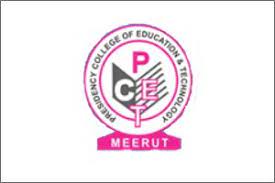PCET, Meerut Recognization & Accreditations
President College of Education & Technology is approved by AICTE (All India Council for Technical Education), National Council for Teacher Education (NCTE) & affiliated with Chaudhary Charan Singh University, Meerut. Presidency College of Education and Technology, situated in Meerut, Uttar Pradesh, is a distinguished institution dedicated to providing quality education in the fields of education and technology. Established with a vision to nurture competent professionals, the college has gained recognition for its commitment to academic excellence, innovative teaching methods, and holistic development of students. The recognitions and accreditations that distinguish Presidency College of Education and Technology, underscore its dedication to maintaining high standards in education.
Institutional Recognition
-
Affiliation with Chaudhary Charan Singh University (CCSU): Presidency College operates under the affiliation of Chaudhary Charan Singh University (CCSU), a leading state university in Uttar Pradesh. This affiliation ensures that the college's programs align with the university's academic framework and adhere to the guidelines set by regulatory bodies.
-
Recognition from National Council for Teacher Education (NCTE): The college may have received recognition from the National Council for Teacher Education (NCTE), a statutory body that ensures the maintenance of standards and quality in teacher education. This recognition is crucial for institutions offering education programs.
Accreditations and Quality Assurance
-
Accreditation from National Board of Accreditation (NBA): Presidency College may have sought accreditation from the National Board of Accreditation (NBA) for its technology programs. NBA accreditation is a testament to the college's commitment to maintaining high-quality standards in education, faculty, and infrastructure in the field of technology.
-
Internal Quality Assurance Cell (IQAC): The college is likely to have established an Internal Quality Assurance Cell (IQAC) to monitor and ensure the quality of academic and administrative processes. IQAC plays a pivotal role in continuous improvement and adherence to quality benchmarks.
Academic Programs and Curriculum Excellence
-
Bachelor of Education (B.Ed.) Program: Presidency College offers a Bachelor of Education (B.Ed.) program designed to prepare future educators. The curriculum focuses on pedagogical skills, educational psychology, and practical teaching experiences to equip students for the teaching profession.
-
Technology Programs: The college may offer technology programs at the undergraduate or postgraduate level, emphasizing practical skills, theoretical knowledge, and industry relevance. These programs are designed to meet the demands of the ever-evolving technology landscape.
Faculty Expertise and Research Initiatives
-
Experienced Faculty: Presidency College prides itself on a team of experienced and qualified faculty members. The faculty's expertise spans education, technology, and related fields, contributing to the delivery of high-quality education.
-
Research and Publications: The college encourages faculty members and students to engage in research activities. Research initiatives may include publications in reputed journals, participation in conferences, and contributions to the respective fields of education and technology.
Industry Interaction and Placement Programs
-
Industry-Linked Curriculum: The college may have developed an industry-linked curriculum for its technology programs, ensuring that students are well-prepared for the demands of the professional landscape.
-
Placement and Career Guidance: Presidency College likely has a dedicated Placement Cell that facilitates interactions with industry professionals, organizes placement drives, and provides career guidance to enhance students' employability.
Internship Opportunities and Skill Development
-
Structured Teaching Internships: For education programs like B.Ed., the college may offer structured teaching internships in schools. These internships provide hands-on teaching experience under the guidance of experienced educators.
-
Technology Internship Programs: In technology programs, the college may collaborate with industry partners to provide internships that expose students to real-world projects, fostering practical skills and industry insights.
Infrastructure and Learning Resources
-
Modern Classrooms and Laboratories: Presidency College is likely equipped with modern classrooms and specialized laboratories for both education and technology programs. These facilities support a dynamic and interactive learning environment.
-
Library Resources: The college's library is expected to house a rich collection of books, journals, and digital resources relevant to education and technology. These resources support academic research and cater to the diverse needs of students.
Student Engagement and Extracurricular Activities
-
Student Clubs and Societies: Presidency College encourages the formation of student clubs and societies, providing platforms for students to engage in extracurricular activities. These activities contribute to the overall development of students.
-
Events and Seminars: The college organizes events, seminars, and workshops that expose students to emerging trends and issues in education and technology. Guest lectures by industry experts and academicians further enrich the learning experience.
Global Exposure and Exchange Programs
-
International Collaborations: The college may explore international collaborations with educational institutions abroad. These collaborations could facilitate student exchange programs, joint research initiatives, and exposure to global educational practices.
-
Cross-Cultural Learning: Students at Presidency College may have opportunities for cross-cultural learning experiences through participation in international conferences, workshops, or collaborative projects with students from diverse backgrounds.
Community Outreach and Social Responsibility
-
Community Development Programs: The college may engage in community development programs, contributing to the welfare of the local community. Initiatives may include awareness campaigns, skill development programs, and educational outreach.
-
Socially Relevant Projects: Students and faculty may participate in socially relevant projects addressing local challenges. These projects reflect the college's commitment to social responsibility and community engagement.
Environmental Sustainability Initiatives
-
Green Campus Initiatives: Presidency College may implement green campus initiatives to promote environmental sustainability. Initiatives could include waste management, energy conservation, and awareness campaigns to foster an eco-friendly campus culture.
-
Research on Environmental Education: The college may encourage research initiatives related to environmental education, integrating sustainability concepts into the curriculum. This approach aligns with global efforts to promote environmental consciousness.

 Meerut, Uttar Pradesh
Meerut, Uttar Pradesh
 Collage
Collage
 2008
2008
 AICTE, NCTE
AICTE, NCTE




 back
back